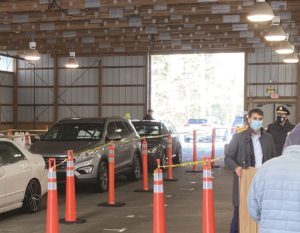PROVINCETOWN — Cape Cod’s struggle to get expanded access to Covid testing took a big step forward this week.
Legislators and county leaders announced that drive-through testing sites will open in Falmouth and Hyannis next week. Pat Nadle, C.E.O. of Outer Cape Health Services, said that asymptomatic testing will begin in Provincetown and Wellfleet the week after that, just before Christmas.
Testing at these sites isn’t through the state’s Stop the Spread program and won’t be free for everyone. Instead, in order to stretch limited resources, the tests will be billed on a sliding scale, and some tests will be billed to insurance. Local legislators have been agitating for a Stop the Spread site on Cape Cod, because it would offer free, no-appointment testing, paid for by the state. The availability of tests on Cape Cod is among the lowest in the commonwealth, even though a serious outbreak is spreading through the middle Cape.
On Monday, Gov. Charlie Baker announced five new free testing sites in Western Mass., plus “expanded testing” in Falmouth. A closer look reveals that four of those Western Mass. sites will be Stop the Spread (Great Barrington, Greenfield, Pittsfield, and North Adams), while the sites in Amherst and Falmouth are described as “free community testing.” This appears to refer to the sliding-scale arrangement, in which many people are eligible for free tests, some tests are billed to insurance, and other people pay out of pocket.
The cost should be less than a commercially available PCR test, although how much less is not yet known.
“I want to note that not all these tests will be free,” said state Rep. Dylan Fernandes (D-Falmouth). “They shouldn’t cost more than $60 per test, with less expensive options available, and anyone who cannot afford a test will not be turned away.”
Barnstable County Health Director Sean O’Brien cautioned that the exact numbers for the sliding scale haven’t been fully worked out. “We should have a better idea [of the out-of-pocket cost] by the end of the week,” said O’Brien.
The tests will cost less than $150, though, because they’re being processed at the Broad Institute, an independent research laboratory affiliated with M.I.T. and Harvard. Broad is charging universities as little as $25 per sample, as opposed to the roughly $100 charged by many commercial labs.
Making a Lasting Program
There’s more than $1 million behind the county’s new testing program, but leaders are preparing to stretch that money into the spring. That’s because much of the funding has come from one-time allocations that legislators put into the budget — and the state delayed paying for months. With the money finally in hand, leaders are looking to make it last.

An earmark of $300,000 was inserted by Rep. Fernandes in July, specifically to support testing in Falmouth. Another $250,000 was earmarked by state Sen. Susan Moran (D-Falmouth), which will go to support the Hyannis drive-through site. Cape Cod Healthcare is matching that $250,000 with a donation. The Hyannis location should be able to process 1,500 to 2,000 tests a week, according to O’Brien and Cape Cod Healthcare C.E.O. Michael Lauf.
The Barnstable County commissioners voted to release $125,000 from an emergency fund to support the expansion of testing. And state Sen. Julian Cyr (D-Truro) added another earmark to the budget currently being considered. That $200,000 has made it through conference committee, according to Cyr’s office, but the overall budget bill still needs to be passed by the legislature and signed by the governor.
In total, that would be $1,125,000 for expanded testing on the Cape. That is a significant achievement, representing the coordinated work of many people — but the scope of the problem is vast. At even the lowball price of $60 a test, $1,125,000 would fully pay for 18,750 tests. That’s fewer than the 19,800 people who were tested in Barnstable County in the last two weeks of November.
The $1.1 million is enough to double testing for two weeks. Then it would be used up. Hence the need for some people to pay on a sliding scale, and the need to bill insurance for some tests.
“We are pretty confident this is not going to meet all of the needs,” said Cyr. “If you look at the public service announcements on TV — ‘Go get tested! It’s free!’ — that’s not what we’re able to do with these sites, because we have limited resources and we’re uncertain if more will be provided. We have to be judicious about the million in resources that we have cobbled together to solve this problem. We’ve got to make that stretch.
“This will put a dent in that ‘testing desert,’ ” Cyr continued. “It will be a big, big help. But we want to be clear that this is not a Stop the Spread site. The delegation will continue to make the clear case that we need additional ongoing resources here.”
The state has spent $150 million on free Covid testing thus far. That, more than anything, helps explain why a million-plus is both great news and just the beginning of what’s needed.



